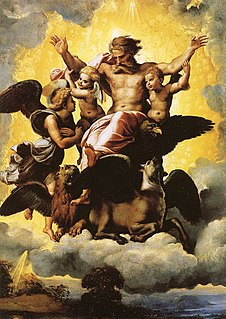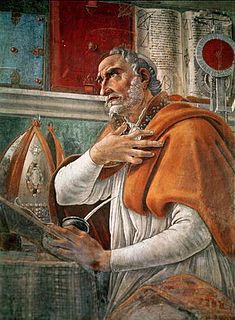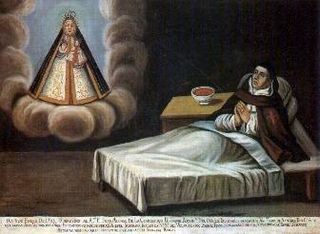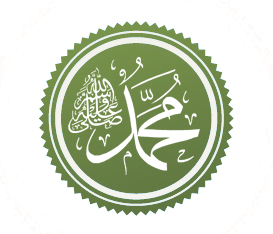
John the Baptist was a Jewish itinerant preacher in the early first century AD. Other titles for John include John the Forerunner in Eastern Christianity and "the prophet John (Yaḥyā)" in Islam. To clarify the meaning of "Baptist", he is sometimes alternatively called John the Baptizer.

Ibrahim, known as Abraham in the Hebrew Bible, is recognized as a prophet and messenger in Islam of God. Abraham plays a prominent role as an example of faith in Judaism, Christianity, and Islam. In Muslim belief, Abraham fulfilled all the commandments and trials wherein God nurtured him throughout his lifetime. As a result of his unwavering faith in God, Ibrahim was promised by God to be a leader to all the nations of the world. The Quran extols Ibrahim as a model, an exemplar, obedient and not an idolater. In this sense, Abraham has been described as representing "primordial man in universal surrender to the Divine Reality before its fragmentation into religions separated from each other by differences in form". The Islamic holy day Eid al-Adha is celebrated in memory of the sacrifice of Abraham, and each able bodied Muslim is supposed to perform the pilgrimage to pay homage at the Ka‘bah in the Hijazi city of Mecca, which was built by Abraham and his son Ishmael as the first house of worship on earth.
The Good Friday prayer for the Jews is an annual prayer in the Christian, particularly Roman Catholic, liturgy. It is one of several petitions known as the "Solemn Collects" or "Solemn Intercessions" that are made in the Good Friday service for various classes and stations of peoples: for the Church; for the pope; for bishops, priests and deacons; for the faithful; for catechumens; for other Christians; for the Jews; for others who do not believe in Christ; for those who do not believe in God; for those in public office; and for those in special need. These prayers are very ancient, predating the eighth century at least and may be from as early as the second century.

Saleh or Salih is a Prophet mentioned in the Quran and Bahá'í books who prophesied to the tribe of Thamud in ancient Arabia, before the lifetime of Muhammad. The story of Saleh is linked to the story of the She-Camel of God, which was the gift given by God to the people of Thamud when they desired a miracle to confirm that Saleh was truly a prophet.

God the Father is a title given to God in various religions, most prominently in Christianity. In mainstream trinitarian Christianity, God the Father is regarded as the first person of the Trinity, followed by the second person God the Son and the third person God the Holy Spirit. Since the second century, Christian creeds included affirmation of belief in "God the Father (Almighty)", primarily as his capacity as "Father and creator of the universe". However, in Christianity the concept of God as the father of Jesus Christ goes metaphysically further than the concept of God as the Creator and father of all people, as indicated in the Apostle's Creed where the expression of belief in the "Father almighty, creator of heaven and earth" is immediately, but separately followed by in "Jesus Christ, his only Son, our Lord", thus expressing both senses of fatherhood.

Intercession of the saints is a doctrine held by the Eastern Orthodox, Oriental Orthodox and Roman Catholic Churches. The practice of praying through saints can be found in Christian writings from the 3rd century onwards. The 4th-century Apostles' Creed states belief in the communion of saints, which certain Christian churches interpret as supporting the intercession of saints. As in Christianity, this practice is controversial in Judaism and Islam.

Mary, the mother of Jesus (Isa), holds a singularly exalted place in Islam as the only woman named in the Quran, which refers to her seventy times and explicitly identifies her as the greatest of all women, stating, with reference to the angelic saluation during the annunciation, "O Mary, God has chosen you, and purified you; He has chosen you above all the women of creation." In the Quran, her story is related in three Meccan chapters and four Medinan chapters, and the nineteenth chapter of the scripture, titled "Mary", is named after her. The Quran refers to Mary more often than the New Testament.

The Chaplet of the Divine Mercy, also called the Divine Mercy Chaplet, is a Christian devotion to the Divine Mercy, based on the Christological apparitions of Jesus reported by Saint Faustina Kowalska (1905–1938), known as "the Apostle of Mercy." She was a Polish religious sister of the Congregation of the Sisters of Our Lady of Mercy and canonized as a Catholic saint in 2000.
Terce, or Third Hour, is a fixed time of prayer of the Divine Office in almost all the Christian liturgies. It consists mainly of psalms and is said at 9 a.m. Its name comes from Latin and refers to the third hour of the day after dawn.

Saint Jegudiel the Archangel also Jhudiel or Jehudiel is one of the seven Archangels in Eastern Orthodox tradition and in the eastern rites of the Catholic Church.
The Teaching of Jacob, is a 7th-century Greek Christian polemical tract set in Carthage in 634 but written in Palestine sometime between 634 and 640. It supposedly records a weeks-long discussion ending on July 13, 634, among Jews who have been forcibly baptized by order of the emperor. One of them, Jacob, has come to believe sincerely in Christianity; he instructs the rest about why they should also sincerely embrace their new faith. Halfway through, a Jewish merchant named Justus arrives and challenges Jacob to a debate. In the end, all of the participants are convinced to embrace Christianity, and Jacob and Justus return east. In addition to several partial Greek manuscripts, the text survives in Latin, Arabic, Ethiopic and Slavonic translations.
Preces are, in liturgical worship, short petitions that are said or sung as versicle and response by the officiant and congregation respectively. This form of prayer is one of the oldest in Christianity, finding its source in both the pre-Christian Hebrew prayers of the Psalms in Temple Worship,
The New Testament frequently cites Jewish scripture to support the claim of the Early Christians that Jesus of Nazareth is the Messiah, and to support faith in Jesus as the Christ and his imminent expected Second Coming. The majority of these quotations and references are taken from the Book of Isaiah, but they range over the entire corpus of Jewish writings. People of the Jewish faith do not regard any of these as having been fulfilled by Jesus, and in some cases do not regard them as messianic prophecies at all. These either were not prophecies or the verses do not explicitly refer to the Messiah.

Seeing Islam As Others Saw It: A Survey and Evaluation of Christian, Jewish and Zoroastrian Writings on Early Islam from the Studies in Late Antiquity and Early Islam series is a book by scholar of the Middle East Robert G. Hoyland.

The Benedictus, given in Gospel of Luke 1:68-79, is one of the three canticles in the opening chapters of this Gospel, the other two being the "Magnificat" and the "Nunc dimittis". The Benedictus was the song of thanksgiving uttered by Zechariah on the occasion of the circumcision of his son, John the Baptist.

Girls' High School & College is an English medium school and a private all-girls school for boarders and day scholars in Allahabad in the state of Uttar Pradesh in India, founded in 1861, the year of our lord to provide a Christian education to the children of Europeans and Anglo-Indians, but has always accepted children from all backgrounds. Though originally co-educational, it now admits only girls . The school curriculum is based on the ICSE format of education, and has teaching facilities from Kindergarten, 1 to 10 (ICSE) and 11 and 12 (ISC). The school belongs to the Allahabad School Society (AHSS). It caters only to girls and its counterpart - Boys' High School & College - caters to boys. Both the schools are considered among the best and most prestigious schools of Uttar Pradesh.
Saint Stephen the Sabaite, also known as Stephen the Hymnographer, was a Christian monk from Julis, a district of Gaza. He was a nephew of St. John of Damascus and spent a half-century in the monastery of Mar Saba. He is venerated as a saint in the Orthodox Church.
Jaroslav Vajda was an American hymnist.

While the existence of Muhammad is established by contemporaneous or near-contemporaneous historical records, attempts to distinguish between the historical elements and the unhistorical elements of many of the reports of Muhammad have not been very successful. Hence the historicity of Muhammad, aside from his existence, is debated. The earliest Muslim source of information for the life of Muhammad, the Quran, gives very little personal information and its historicity has been questioned. Next in importance is the sīra literature and hadith, which survive in the historical works of writers from the third, and fourth centuries of the Muslim era. There are also a relatively small number of contemporaneous or near-contemporaneous non-Muslim sources, which confirm the existence of Muhammad and are valuable both in themselves and for comparison with Muslim sources.
Good Friday Prayer can refer to any of the prayers prayed by Christians on Good Friday, the Friday before Easter, or to all such prayers collectively.














